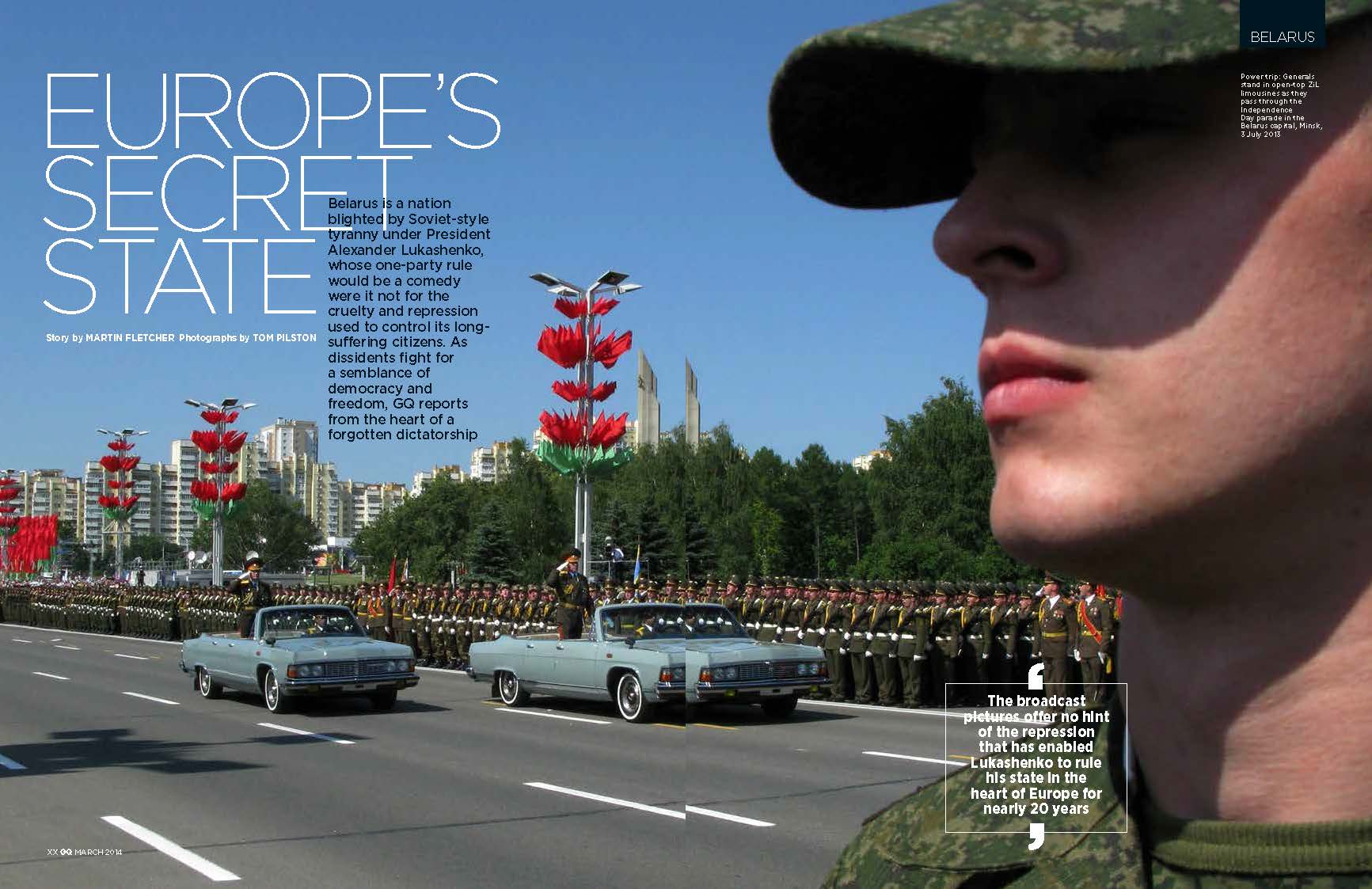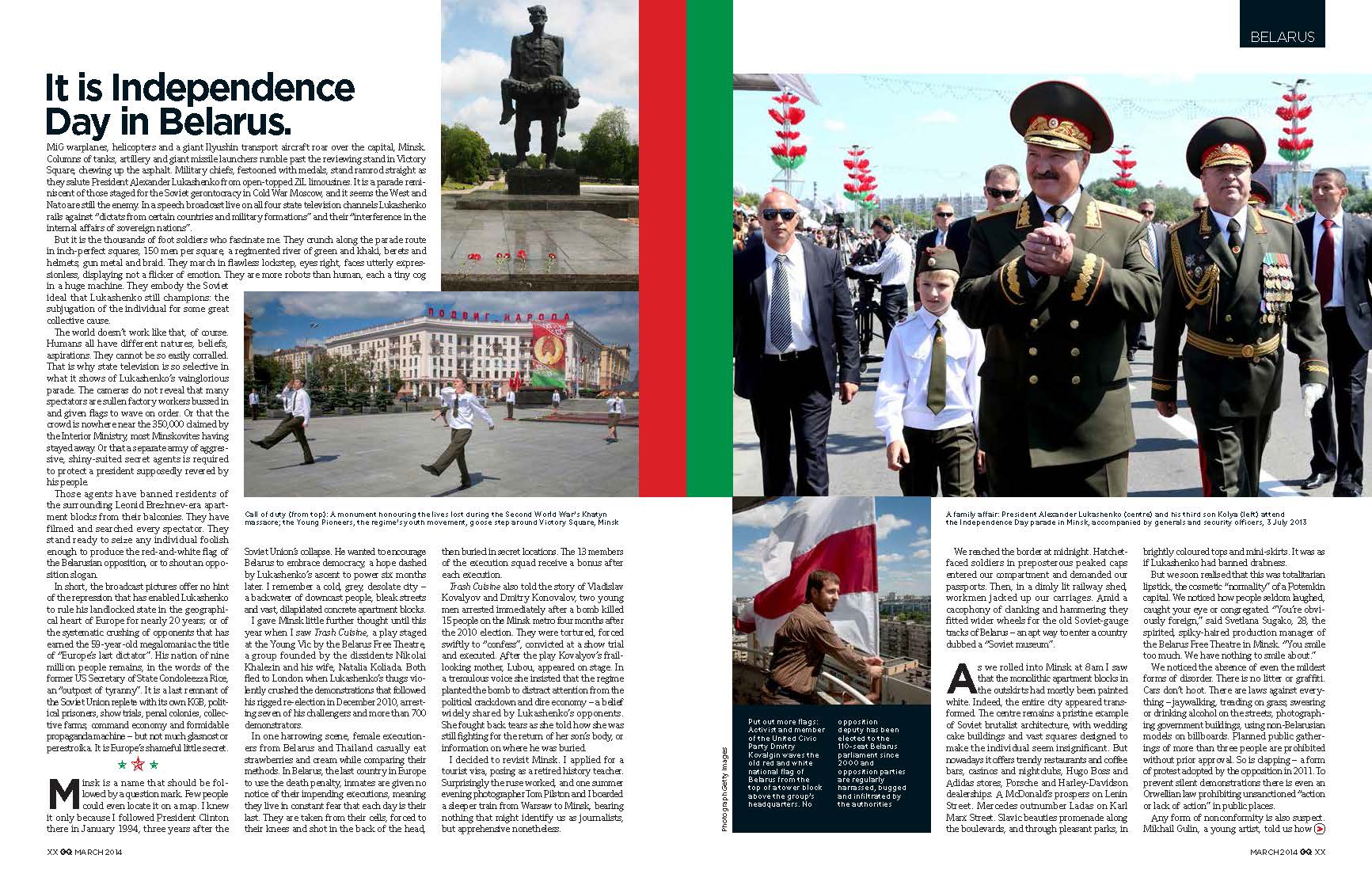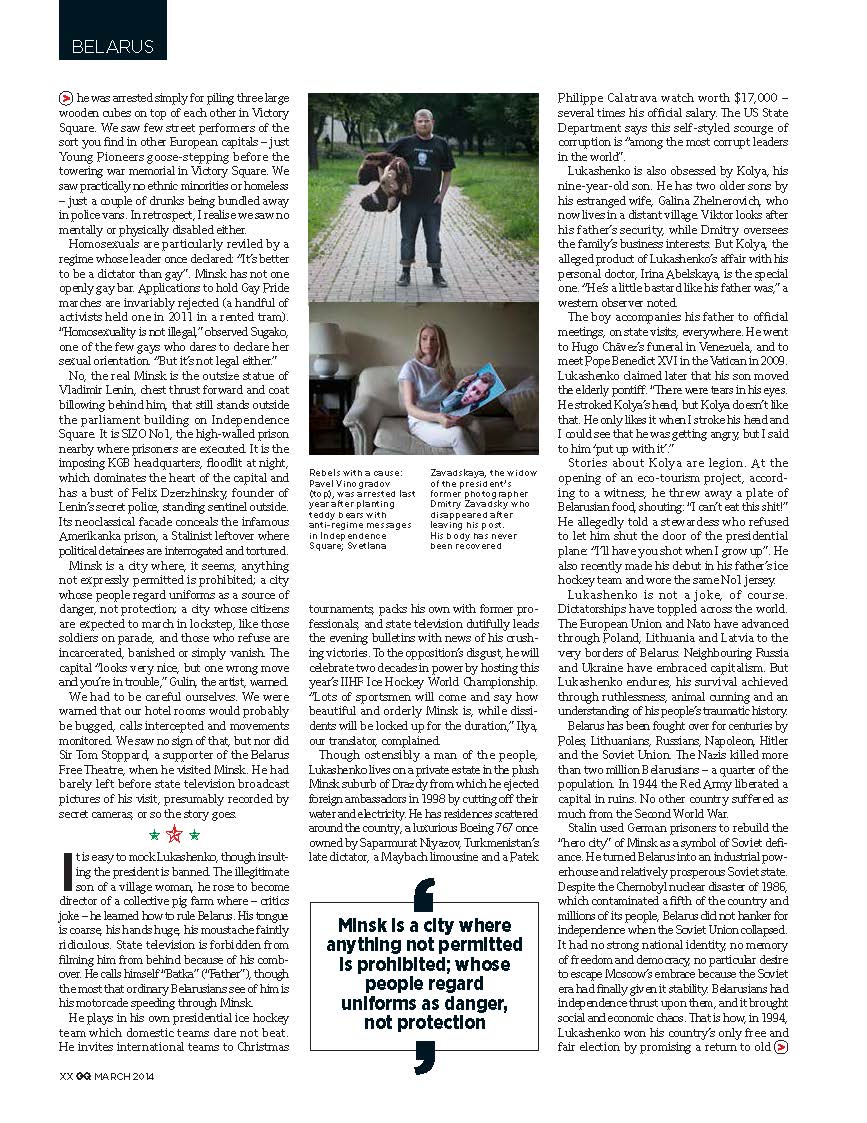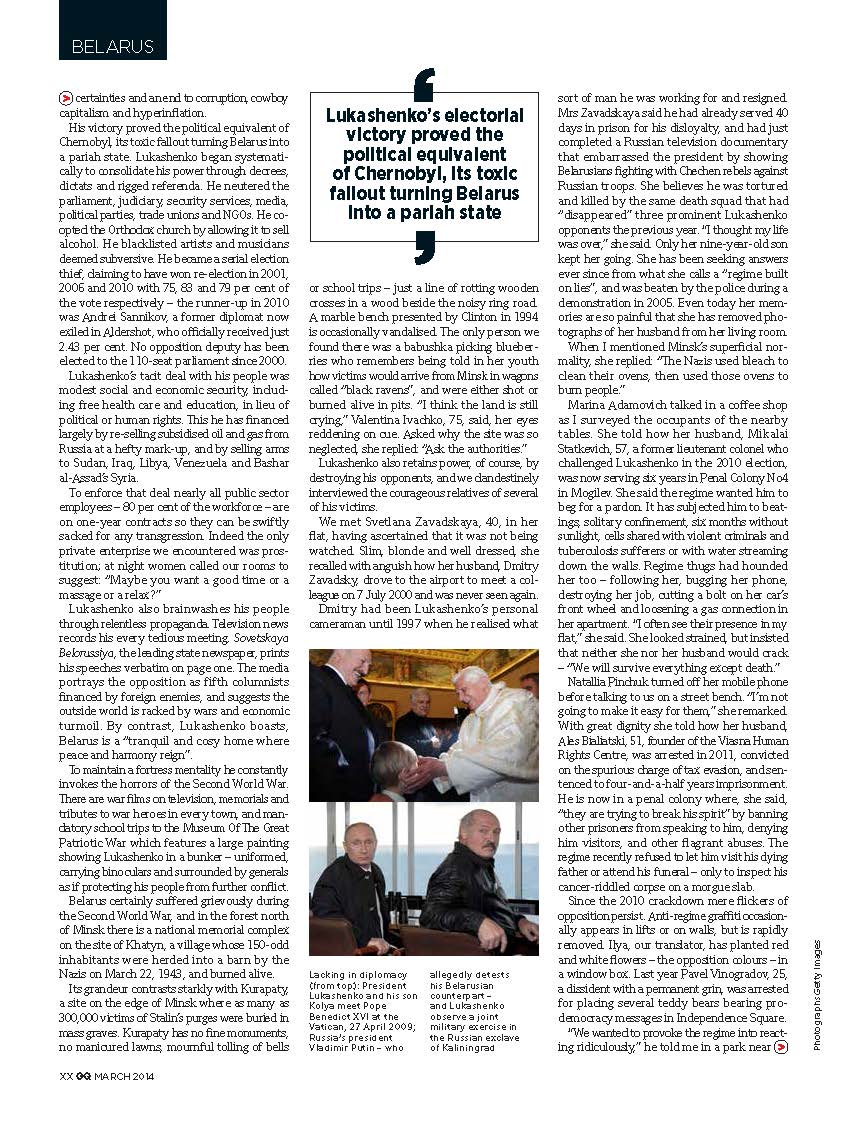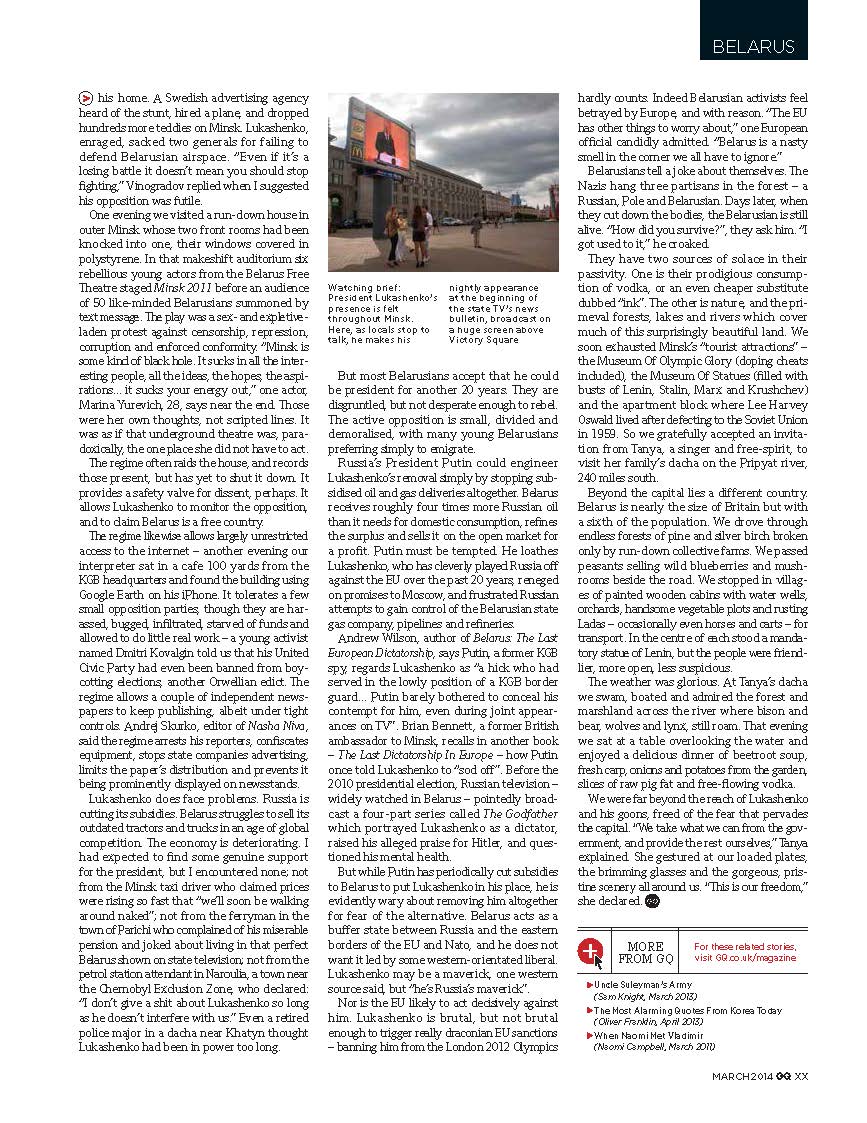February 2014
Photos by Tom Pilston
It is Independence Day in Belarus. MiG warplanes, helicopters and a giant Ilyushin transport aircraft roar over Minsk. Columns of tanks, artillery and giant missile launchers rumble past the reviewing stand in Victory Park, chewing up the asphalt. Military chiefs, festooned with medals, stand ramrod straight as they salute President Alexander Lukashenko from open-topped Zil limousines. It is a parade reminiscent of those staged for the Soviet gerontocracy in Cold War Moscow, and it seems the West and Nato are still the enemy. In a speech broadcast live on all four state television channels Lukashenko rails against “dictats from certain countries and military formations” and their “interference in the internal affairs of sovereign nations”.
But it is the thousands of foot soldiers who fascinate me. They crunch along the parade route in inch-perfect squares, 150 men per square, a regimented river of green and khaki, berets and helmets, gun metal and braid. They march in flawless lock step, eyes right, faces utterly expressionless, displaying not a flicker of emotion. They are more robots than human, each a tiny cog in a huge machine. They embody the Soviet ideal that Lukashenko still champions: the subjugation of the individual for some great collective cause.
The world doesn't work like that, of course. Humans all have different natures, beliefs, aspirations. They cannot be so easily corralled. That is why state television is so selective in what it shows of Lukashenko's vainglorious parade. The cameras do not reveal that many spectators are sullen factory workers bussed in and given flags to wave on order. Or that the crowd is nowhere near the 350,000 claimed by the Interior Ministry, most Minskovites having stayed away. Or that a separate army of aggressive, shiny-suited secret agents is required to protect a president supposedly revered by his people.
Those agents have banned residents of the surrounding Brezhnev-era apartment blocks from their balconies. They have filmed and searched every spectator. They stand ready to seize any individual foolish enough to produce the red-and-white flag of the Belarusian opposition, or to shout an opposition slogan.
In short, the broadcast pictures offer no hint of the repression that has enabled Lukashenko to rule his landlocked state in the geographical heart of Europe for nearly 20 years; or of the systematic crushing of opponents that has earned the 59-year-old megalomaniac the title of “Europe's last dictator”. His nation of nine million people remains, in the words of Condoleezza Rice, an “outpost of tyranny”. It is a last remnant of the Soviet Union replete with its own KGB, political prisoners, show trials, penal colonies, collective farms, command economy and formidable propaganda machine – but not much glasnost or perestroika. It is Europe's shameful little secret.
Minsk is a name that should be followed by a question mark. Few people could even locate it on a map. I knew it only because I followed President Clinton there in January 1994, three years after the Soviet Union's collapse. He wanted to encourage Belarus to embrace democracy, a hope dashed by Lukashenko's ascent to power six months later. I remember a cold, grey, desolate city – a backwater of downcast people, bleak streets and vast, dilapidated concrete apartment blocks.
I gave little Minsk further thought until this year when I saw 'Trash Cuisine', a play staged at the Young Vic by the Belarus Free Theatre, a group founded by the dissidents Nicolai Khalezin and his wife, Natalia Kaliada. Both fled to London when Lukashenko's thugs violently crushed the demonstrations that followed his rigged re-election in December 2010, arresting seven of his challengers and more than 700 demonstrators.
In one harrowing scene female executioners from Belarus and Thailand casually eat strawberries and cream while comparing their methods. In Belarus, the last country in Europe to use the death penalty, inmates are given no notice of their impending executions, meaning they live in constant fear that each day is their last. They are taken from their cells, forced to their knees and shot in the back of the head, then buried in secret locations. The 13 members of the execution squad receive a bonus after each execution.
'Trash Cuisine' also told the story of Vladislav Kavaliou and Dmitri Kanavalou, two young men arrested immediately after a bomb killed 15 people on the Minsk metro four months after the 2010 election. They were tortured, forced swiftly to “confess”, convicted at a show trial and executed. After the play Kavaliou's frail-looking mother, Lubou, appeared on stage. In a tremulous voice she insisted that that the regime planted the bomb to distract attention from the political crackdown and dire economy – a belief widely shared by Lukashenko's opponents. She fought back tears as she told how she was still fighting for the return of her son's body, or information on where he was buried.
I decided to revisit Minsk. I applied for a tourist visa, posing as a retired history teacher. Surprisingly the ruse worked, and one summer evening Tom Pilston, a photographer, and I boarded a sleeper train from Warsaw to Minsk, bearing nothing that might identify us as journalists but apprehensive nonetheless.
We reached the border at midnight. Hatchet-faced soldiers in preposterous peaked caps entered our compartment and demanded our passports. Then, in a dimly-lit railway shed, workmen jacked up our carriages. Amid a cacophony of clanking and hammering they fitted wider wheels for the old Soviet-gauge tracks of Belarus - an apt way to enter a country dubbed a “Soviet museum”.
As we rolled into Minsk at 8.00am I saw that the monolithic apartment blocks in the outskirts had mostly been painted white. Indeed the entire city appeared transformed. The centre remains a pristine example of Soviet brutalist architecture, with wedding cake buildings and vast squares designed to make the individual seem insignificant. But nowadays it offers trendy restaurants and coffee bars, casinos and night clubs, Hugo Boss and Adidas stores, Porsche and Harley-Davidson dealerships. A McDonalds prospers on Lenin Street. Mercedes outnumber Ladas on Karl Marx Street. Long-limbed Slavic beauties promenade along the boulevards, and through pleasant parks, in brightly coloured tops and mini-skirts. It was as if Lukashenko had banned drabness.
But we soon realised that this was totalitarian lipstick, the cosmetic “normality” of a Potemkin capital. We noticed how people seldom laughed, caught your eye or congregated. “You're obviously foreign,” said Svetlana Sugako, 28, the spirited, spiky-haired manager of the Belarus Free Theatre in Minsk. “You smile too much. We have nothing to smile about.”
We noticed the absence of even the mildest forms of disorder. There is no litter or graffiti. Cars don't hoot. There are laws against everything - jaywalking, treading on grass, swearing or drinking on the streets, photographing government buildings, using non-Belarusian models on billboards. Planned public gatherings of more than three people are prohibited without prior approval. So is clapping - a form of protest adopted by the opposition in 2011. To prevent silent demonstrations there is even an Orwellian law prohibiting unsanctioned “action or lack of action” in public places.
Any form of non-conformity is also suspect. Mikhail Gulin, a young artist, told us how he was arrested simply for piling three large wooden cubes on top of each other in October Square. We saw few streets performers of the sort you find in other European capitals – just Young Pioneers goose-stepping before the towering war memorial in Victory Square. We saw practically no ethnic minorities or homeless - just a couple of drunks being bundled away in police vans. In retrospect, I realise we saw no mentally or physically disabled either.
Homosexuals are particularly reviled by a regime whose leader once declared: “It's better to be a dictator than gay”. Minsk has not one openly gay bar. Applications to hold Gay Pride marches are invariably rejected (a handful of activists held one last year in a rented tram). “Homosexuality is not illegal,” observed Sugako, one of the few gays who dares to declare her sexual orientation. “But it's not legal either.”
No, the real Minsk is the outsize statue of Lenin, chest thrust forward and coat billowing behind him, that still stands outside the parliament building on Independence Square. It is SIZO No 1, the high-walled prison nearby where prisoners are executed. It is the imposing KGB headquarters, floodlit at night, which dominates the heart of the capital and has a bust of Felix Dzherzhinsky, founder of Lenin's secret police, standing sentinel outside. Its neo-classical facade conceals the infamous Amerikanka prison, a Stalinist leftover where political detainees are interrogated and tortured.
Minsk is a city where, it seems, anything not expressly permitted is prohibited; a city whose people regard uniforms as a source of danger, not protection; a city whose citizens are expected to march in lockstep, like those soldiers on parade, and those who refuse are incarcerated, banished or simply vanish. The capital “looks very nice, but one wrong move and you're in trouble,” Gulin, the artist, warned.
We had to be careful ourselves. We were warned that our hotel rooms would probably be bugged, calls intercepted and movements monitored. We saw no sign of that, but nor did Sir Tom Stoppard, a supporter of the Belarus Free Theatre, when he visited Minsk. He had barely left before state television broadcast pictures of his visit, presumably recorded by secret cameras, or so the story goes.
It is easy to mock Lukashenko, though insulting the president is naturally banned. The bastard son of a village woman, he rose to become director of a collective pig farm where - critics joke - he learned how to rule Belarus. His tongue is coarse, his hands huge, his moustache faintly ridiculous. State television is forbidden from filming him from behind because of his comb-over. He calls himself 'Batka' ('Father'), though the most that ordinary Belarusians see of him is his motorcade speeding through Minsk.
He plays in his own presidential ice hockey team which domestic teams dare not beat. He invites foreign teams to New Year tournaments, packs his own with professionals, and state television dutifully leads the evening bulletins with news of his crushing victories. To the opposition's disgust, he will celebrate two decades in power by hosting next year's World Ice Hockey Championships. “Lots of sportsmen will come and say how beautiful and orderly Minsk is while dissidents will be locked up for the duration,” Ilya, our translator, complained.
Though ostensibly a man of the people, Lukashenko lives on a private estate in the plush Minsk suburb of Drazdy from which he ejected foreign ambassadors in 1998 by cutting off their water and electricity. He has residences scattered around the country, a luxurious Boeing 767 once owned by Turkmenbashi, Turkmenistan's late dictator, a Maybach limousine and a Patek Philippe Calatrava watch worth $25,000 – several times his official salary. The US State Department says this self-styled scourge of corruption is “among the most corrupt leaders in the world”
Lukashenko is also obsessed by Kolya, his nine-year-old son. He has two older sons by his estranged wife, Galina Zhelnerovich, who now lives in a distant village far. Viktor looks after his father's security while Dmitri oversees the family's business interests. But Kolya, the product of Lukashenko's affair with his personal doctor, Irina Abelskaya, is the special one. “He's a little bastard like his father was,” a western observer noted.
The boy accompanies his father to official meetings, on state visits, everywhere. He went to Hugo Chavez's funeral in Venezuela, and to meet Pope Benedict XVI in the Vatican in 2009. Lukashenko claimed later that his son moved the elderly pontiff. “There were tears in his eyes. He stroked Kolya's head but Kolya doesn't like that. He only likes it when I stroke his head and I could see that he was getting angry, but I said to him 'put up with it'.”
Stories about Kolya are legion. At the opening of an eco-tourism project he threw away a plate of traditional Belarusian food, shouting: “I can't eat this shit!” He allegedly told a stewardess who refused to let him shut the door of the presidential plane: “I'll have you shot when I grow up”. He recently made his debut in his father's ice hockey team and wore the same number – 1.
Lukashenko is not a joke, of course. Dictatorships have toppled across the world. The European Union and Nato have advanced through Poland, Lithuania and Latvia to the very borders of Belarus. Neighbouring Russia and Ukraine have embraced capitalism. But Lukashenko endures, his survival achieved through ruthlessness, animal cunning and a keen understanding of his people's uniquely traumatic history.
Belarus has been fought over for centuries by Poles, Lithuanians, Russians, Napoleon, Hitler and the Soviet Union. The Nazis killed two million Belarusians - a quarter of the population. In 1944 the Red Army liberated a capital in ruins. No other country suffered as much from World War Two.
Stalin used German prisoners to rebuild the “hero city” of Minsk as a symbol of Soviet defiance. He turned Belarus into an industrial powerhouse and relatively prosperous Soviet state. Despite the Chernobyl nuclear disaster of 1986, which contaminated a fifth of the country and millions of its people, Belarus did not hanker for independence when the Soviet Union collapsed. It had no strong national identity, no memory of freedom and democracy, no particular desire to escape Moscow's embrace because the Soviet era had finally given it stability. Belarusians had independence thrust upon them, and it brought social and economic chaos. That is how, in 1994, Lukashenko won his country's only free and fair election by promising a return to old certainties and an end to corruption, cowboy capitalism and hyperinflation.
His victory proved the political equivalent of Chernobyl, its toxic fallout turning Belarus into a pariah state. Lukashenko began systematically to consolidate his power through decrees, dictats and rigged referenda. He neutered the parliament, judiciary, security services, media, political parties, trade unions and NGOs. He co-opted the Orthodox church by allowing it to sell alcohol. He blacklisted artists and musicians deemed subversive. He became a serial election thief, claiming to have won re-election in 2001, 2006 and 2010 with 75, 83 and 79 per cent of the vote respectively – the runner-up in 2010 was Andrei Sannikou, a former diplomat now exiled in Aldershot, who officially received just 2.43 per cent. No opposition deputy has been elected to the 110-seat parliament since 2000.
Lukashenko's tacit deal with his people was modest social and economic security, including free health care and education, in lieu of political or human rights. This he has financed largely by re-selling subsidised oil and gas from Russia at a hefty mark-up, and by flogging arms to Sudan, Iraq, Libya, Venezuela and Bashar Assad's Syria.
To enforce that deal all public sector employees – 80 per cent of the workforce – are on one-year contracts so they can be swiftly sacked for any transgression. Indeed the only private enterprise we encountered was prostitution; at night women called our rooms to suggest: “Maybe you want a good time or a massage or a relax?”.
Lukashenko also brainwashes his people through relentless propaganda. Television news records his every tedious meeting. Sovietskaya Belarussia, the leading state newspaper, prints his speeches verbatim on page one. The media portrays the opposition as fifth columnists financed by foreign enemies, and suggests the outside world is racked by wars and economic turmoil. By contrast, Lukashenko boasts, Belarus is a “tranquil and cosy home where peace and harmony reign”.
To maintain a fortress mentality he constantly invokes the horrors of World War Two. There are war films on television, memorials and tributes to war heroes in every town, and mandatory school trips to the Great Patriotic War Museum which features a large painting showing Lukashenko in a bunker – uniformed, carrying binoculars and surrounded by generals as if protecting his people from further conflict.
Belarus certainly suffered grievously during World War Two, and in the forest north of Minsk there is an impressive national memorial complex on the site of Khatyn, a village whose 150-odd inhabitants were herded into a barn by the Nazis on March 22, 1943, and burned alive.
Its grandeur contrasts starkly with Kurapaty, a site on the edge of Minsk where as many as 300,000 victims of Stalin's purges were buried in mass graves. Kurapaty has no fine monuments, no manicured lawns, mournful tolling of bells or school trips – just a line of rotting wooden crosses in a wood beside the noisy ring road. A marble bench presented by Clinton in 1994 is occasionally vandalised. The only person we found there was a babushka picking blueberries who remembers being told in her youth how victims would arrive from Minsk in wagons called 'black ravens', and were either shot or burned alive in pits. “I think the land is still crying,” Valentina Ivachko, 75, said, her eyes reddening on cue. Asked why the site was so neglected, she replied: “Ask the authorities.”
Lukashenko also retains power, of course, by destroying his opponents, and we clandestinely interviewed the courageous relatives of several of his victims.
We met Svetlana Zavadskaya, 40, in her flat, having ascertained that it was not being watched. Slim, blonde and well dressed, she recalled with evident anguish how her husband, Dmitri Zavadsky, drove to the airport to meet a colleague on July 7, 2000 and was never seen again.
Dmitri had been Lukashenko's personal cameraman until 1997 when he realised what sort of man he was working for and resigned. Mrs Zavadskaya said he had already served 40 days in prison for his disloyalty, and had just completed a Russian television documentary that embarrassed the president by showing Belarusians fighting with Chechen rebels against Russian troops. She believes he was tortured and killed by the same death squad that had “disappeared” three prominent Lukashenko opponents the previous year. “I thought my life was over,” she said. Only her nine-year-old son kept her going. She has been seeking answers ever since from what she calls a “regime built on lies”, and was beaten by the police during a demonstration in 2005. Even today her memories are so painful that she has removed photographs of her husband from her living room.
When I mentioned Minsk's superficial normality, she replied: “The Nazis used bleach to clean their ovens, then used those ovens to burn people.”
Marina Adamovich talked in a coffee shop as I nervously surveyed the occupants of the nearby tables She told how her husband, Mikalai Statkevich, 57, a former lieutenant colonel who rashly challenged Lukashenko in the 2010 election, was now serving six years in Penal Colony No.4 in Mogilev. She said the regime wanted him to beg for a pardon. It has subjected him to beatings, solitary confinement, six months without sunlight, cells shared with particularly violent criminals and tuberculosis sufferers or with water streaming down the walls. Regime thugs had hounded her too – following her, bugging her phone, destroying her job, cutting a bolt on her car's front wheel and loosening a gas connection in her apartment. “I often see their presence in my flat,” she said. She looked strained, but insisted that neither she nor her husband would crack - “We will survive everything except death.”
Natallia Pinchuk turned off her mobile phone before talking to us on a street bench. “I'm not going to make it easy for them,” she remarked. With great dignity she told how her husband, Ales Bialiatsky, 50, founder of the Viasna human rights centre, was arrested in 2011, convicted on the spurious charge of tax evasion, and sentenced to four-and-a-half years imprisonment. He is now in a penal colony where, she said, “they are trying to break his spirit” by banning other prisoners from speaking to him, denying him visitors on the flimsiest pretexts, and other flagrant abuses. The regime recently refused to let him visit his dying father or attend his funeral – only to inspect his cancer-riddled corpse on a morgue slab.
Since the 2010 crackdown mere flickers of opposition persist. Anti-regime graffiti occasionally appears in lifts or on walls, but is rapidly removed. Ilya, our translator, has planted red and white flowers – the opposition colours - in a window box. Last year Pavel Vinagradov, 25, an irrepressible dissident with a permanent grin, was arrested for placing 15 teddy bears bearing pro-democracy messages in Independence Square.
“We wanted to provoke the regime into reacting ridiculously,” he told me in a park near his home. A Swedish advertising agency heard of the stunt, hired a plane, and dropped hundreds more teddies on Minsk. Lukashenko, enraged, sacked two generals for failing to defend Belarusian airspace. “Even if it's a losing battle it doesn't mean you should stop fighting,” Vinagradov replied when I suggested his opposition was futile.
One evening we visited a run-down house in outer Minsk whose two front rooms had been knocked into one, their windows covered in polystyrene. In that makeshift auditorium six rebellious young actors from the Belarus Free Theatre staged 'Minsk 2011' before an audience of 50 like-minded Belarusians summoned by text message. The play was a sex- and expletive-laden protest against censorship, repression, corruption and enforced conformity. “Minsk is some kind of black hole. It sucks in all the interesting people, all the ideas, the hopes, the aspirations...it sucks your energy out,” one actor, Marina Yurevich, 28, says near the end. Those were her own thoughts, not scripted lines. It was as if that underground theatre was, paradoxically, the one place she did not have to act.
The regime regularly raids the house, and records those present, but has yet to shut it down. It provides a safety valve for dissent, perhaps. It allows Lukashenko to monitor the opposition, and to claim Belarus is a free country.
The regime likewise allows largely unrestricted access to the internet - another evening our interpreter sat in a cafe 100 yards from the KGB headquarters and Google-Earthed the building on his I-phone. It tolerates a few small opposition parties, though they are harassed, bugged, infiltrated, starved of funds and allowed to do little real work – a young activist named Dmitri Kovaldin told us that his United Civic Party had even been banned from boycotting elections, another Orwellian edict. The regime allows a couple of independent newspapers to keep publishing, albeit under tight controls. Andrej Skurko, editor of Nasha Niva, said the regime arrests his reporters, confiscates equipment, stops state companies advertising, limits the paper's distribution and prevents it being prominently displayed on news stands.
Lukashenko does face problems. Russia is cutting its subsidies. Belarus struggles to sell its outdated tractors and trucks in an age of global competition. The economy is deteriorating. I had expected to find some genuine support for the president, but I encountered practically none; not from the Minsk taxi driver who claimed prices were rising so fast that “we'll soon be walking around naked”; not from the ferryman in the town of Parichi who complained of his miserable pension and joked about living in that perfect Belarus shown on state television; not from the petrol station attendant in Naroulia, a town near the Chernobyl exclusion zone, who declared: “I don't give a shit about Lukashenko so long as he doesn't interfere with us.” Even a retired police major in a dacha near Khatyn thought Lukashenko had been in power too long.
But most Belarusians accept that he could be president for another 20 years. They are disgruntled, but not desperate enough to rebel. The active opposition is small, divided and demoralised, with many young Belarusians preferring simply to emigrate.
Russia's President Putin could engineer Lukashenko's removal simply by stopping subsidised oil and gas deliveries altogether. Belarus receives roughly four times more Russian oil than it needs for domestic consumption, refines the surplus and sells it on the open market for a handsome profit. Putin must be tempted. He loathes Lukashenko, who has cleverly played Russia off against the EU over the past 20 years, reneged on promises to Moscow, and frustrated Russian attempts to gain control of the Belarusian state gas company, pipelines and refineries.
Andrew Wilson, author of 'Belarus: The Last European Dictatorship', says Putin, a former KGB spy, regards Lukashenko as “a hick who had served in the lowly position of a KGB border guard...Putin barely bothered to conceal his contempt for him, even during joint appearances on TV”. Brian Bennett, a former British ambassador to Minsk, recalls in another book – 'The Last Dictatorship in Europe' - how Putin once told Lukashenko to “sod off”. Before the 2010 presidential election Russian television – widely watched in Belarus – pointedly broadcast a four-part series called 'The Godfather' which portrayed Lukashenko as a dictator, raised his alleged praise for Hitler, and questioned his mental health.
But while Putin has periodically cut subsidies to Belarus to put Lukashenko in his place, he evidently fears to remove him altogether for fear of the alternative. Belarus acts as a buffer state between Russia and the eastern borders of the EU and Nato, and he does not want it led by some western-orientated liberal. Lukashenko may be a maverick, one western source said, but “he's Russia's maverick”.
Nor is the EU likely to act decisively against him. Lukashenko is brutal, but not brutal enough to trigger really draconian EU sanctions - banning him from the London Olympics hardly counts. Indeed Belarusian activists feel betrayed by Europe, and with reason. “The EU has other things to worry about,” one European official candidly admitted. “Belarus is a nasty smell in the corner we all have to ignore.”
Belarusians tell a joke about themselves. The Nazis hang three partisans in the forest – a Russian, Pole and Belarusian. Days later, when they cut down the bodies, the Belarusian is still alive. “How did you survive?”, they ask him. “I got used to it,” he croaked.
They have two sources of solace in their passivity. One is their prodigious consumption of vodka, or an even cheaper substitute dubbed “ink”. The other is nature, and the primeval forests, lakes and rivers which cover much of this surprisingly beautiful land. We soon exhausted Minsk's “tourist attractions” - the Museum of Olympic Glory (doping cheats included), the Museum of Statues (filled with busts of Lenin, Stalin, Marx and Krushchev) and the apartment block where Lee Harvey Oswald lived after defecting to the Soviet Union in 1959. So we gratefully accepted an invitation from Tanya, a singer and free-spirit, to visit her family's dacha on the Pripyat river, 200 miles south.
Beyond the capital lies a different country. Belarus is nearly Britain's size but with a sixth of the population. We drove through endless forests of pine and silver birch broken only by run-down collective farms. We passed peasants selling wild blueberries and mushrooms beside the road. We stopped in villages of painted wooden cabins with water wells, orchards, handsome vegetable plots and rusting Ladas - occasionally even horses and carts - for transport. In the centre of each stood a mandatory statue of Lenin, but the people were friendlier, more open, less suspicious.
The weather was glorious. At Tanya's dacha we swam, boated and admired the forest and marshland across the river where bison and bear, wolves and lynx, still roam. That evening we sat at a table overlooking the tranquil water and enjoyed a delicious dinner of cold beetroot soup, fresh carp, onions and potatoes from the garden, slices of raw pig fat and free-flowing vodka.
We were far beyond the reach of Lukashenko and his goons, freed of the fear that pervades the capital. “We take what we can from the government, and provide the rest ourselves,” Tanya explained. She gestured at our loaded plates, the brimming glasses and the gorgeous, pristine scenery all around us. “This is our freedom,” she declared.

